-
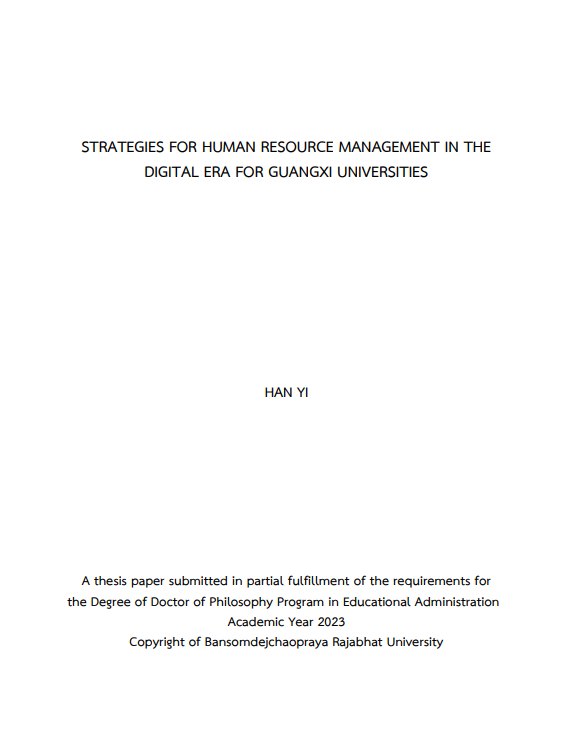
The objectives of this research were: 1) to study the current situation of human resource management in the digital era for Guangxi universities. 2) to study strategies for human resource management in digital era for Guangxi universities. 3) to evaluate the suitability and feasibility of strategies for human resource management in digital era for Guangxi universities. The sample were group included 375 administrators in 10 public universities in Guangxi. Research instruments include: 1) questionnaire, 2) SWOT analysis, 3) focus group discussion, and 4) evaluation form. data analysis by using percentage, mean, standard deviation and content analysis.
The results were found that: 1) the current situation of human resource management in the digital era for Guangxi universities was at high level. Consider for the result of the study aspects ranged from the highest to the lowest level were as following: the highest mean was Salary and Benefits Management, followed by Recruitment Management, Performance Evaluation, Training and Development, Employee Relations Management and Human Resource Planning was the lowest mean. 2) For strategies for human resource management in the digital era for Guangxi universities: 1) improving human resource planning 8 measures, 2) developing recruitment management 11 measures, 3) promoting training and development 8 measures, 4) supporting performance evaluation 10 measures, 5) enhancing salary and benefits management 10 measures, 6) solving employee relations management 9 measures, with a total of 56 measures. 3) The suitability and feasibility evaluation result of the strategies are at highest mean.
Keywords: Strategies, Human Resource Management, Digital Era
-
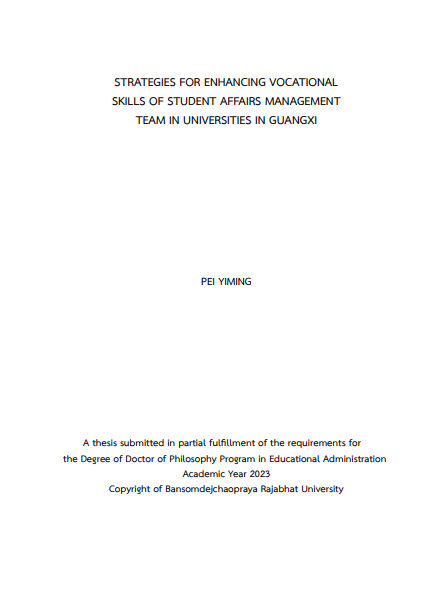
The objectives of this study are: 1) to study the current situation in vocational skills of student affairs management team in universities in Guangxi, 2) to study the strategies for enhancing vocational skills of student affairs management team in universities in Guangxi, and 3) to evaluate the suitability and feasibility of the strategies for enhancing vocational skills of student affairs management team in universities in Guangxi. Sample group of this study was 291 student affairs managers from 10 different types of public universities in Guangxi. Research instruments included: 1) literature review, 2) questionnaire, 3) SWOT analysis, 4) focus group discussion, and 5) evaluation form. Data analysis is performed by percentages, mean, standard deviation, and content analysis.
The results show that: 1) The current situation of vocational skills of student affairs management team in universities in Guangxi in six aspects was at a high level. The result of the current situation was as follows: skills training was the highest mean, followed by knowledge structure, and training channels was the lowest mean. 2)Strategies for enhancing vocational skills of student affairs management team in universities in Guangxi included six aspects, with a total of 38 measures: 1) 5 measures for establishing a comprehensive knowledge structure, 2) 8 measures for establishing a sound management system, 3) 6 measures for establishing an extensive training channel, 4) 5 measures for establishing a skills training system, 5) 7 measures for establishing a good work incentive mechanism, and 6) 6 measures for establishing a sound evaluation mechanism3) Suitability and feasibility of strategies for enhancing the vocational skills of student affairs management team in universities in Guangxi was at high level.
Keywords: Strategies, Enhance Vocational Skills, Universities in Guangxi, Student Affairs Management Team
-
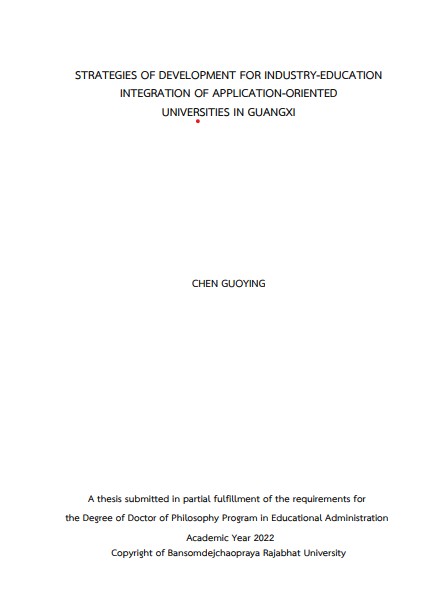
The objectives of this research were: 1) to study the level of industry-education integration of Application-oriented Universities in Guangxi, 2) to develop strategies of development for industry-education integration of Application-oriented Universities in Guangxi, 3) to evaluate the strategies of development of industry-education integration of Application-oriented Universities in Guangxi. The sample group included 155 managers involved in the industry-education integration from 10 Application-oriented Universities in Guangxi. The research instruments involved: 1) questionnaire, 2) structured interviews, and 3) expert strategy evaluation. The data were analyzed by percentage, average value, and standard deviation.
The research results show that: the level of industry-education integration in Guangxi Application-oriented Universities in overall was at medium level. Consider for the result of the study aspects ranged from the highest to the lowest level were as following: the highest level was management Mechanism, followed by talent Development, and financial Management was the lowest level. For strategies of development for industry-education integration of application-oriented universities in Guangxi, the researcher proposes: 1) improving teacher resources management, 2) supporting financial management, 3) promoting management mechanism, and 4) promoting talent development, there are 4 strategies with a total of 20 measures. The adaptability and feasibility evaluation results of the strategies are at high level.
Keywords: Strategies of development, Industry-education integration, Application-oriented Universities
-
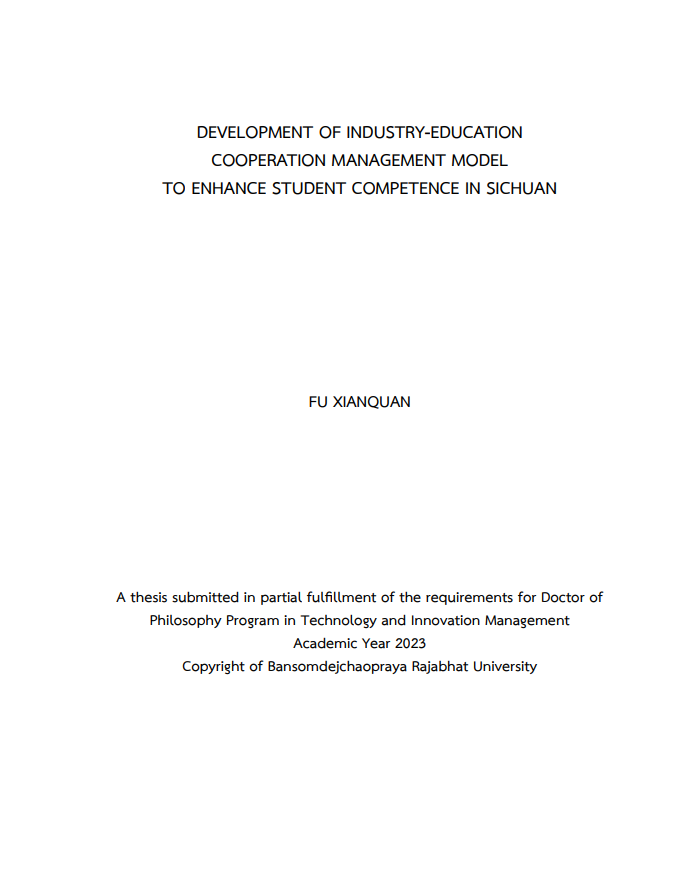
The study on "Development of Industry-Education Cooperation Management Model to Enhance Student Competence in Sichuan" has4 specific objectives: 1) Toidentify current problems, opportunities, and key success factors of industry-education cooperation. 2) To evaluate appropriate elements for industry-education cooperation
management model to enhancestudent competence in Sichuan. 3) To design an effective industry-education cooperation management model to enhance student competence in Sichuan. 4) To evaluate the industry-education cooperation management model to enhance student competence in Sichuan. Objective 1 research method uses literature survey and use the result for design a questionnaire to survey 21 experts’ opinion, and interview 5 experts to confirmed. Objective 2 uses structured in-depth interview method to interview 11 project coordinators from 6 industry-education cooperation projects. Objective 3 Invite 21 experts feedback to build a graphical model. Objective 4 uses 5 experts to evaluate the model based on CIPP evaluation principle.
The results revealed that:
1. The current problems are lack of coordination, lack of supportive cooperative environment, imperfect policies and systems, insufficient resource sharing, inadequate organizational support, communication and coordination hindered, benefits not effectively matched and low-level and superficial cooperation. Opportunities are strong
policy support, modern industrial development, increasing demand for highly skilled personnel, development of modern vocational education systems, educational positioning in vocational education, and integrated development. Key success factors are university resource investment, industry resource investment, government support intensity, social industrial structure, technological innovation and transformation, policies
and institutions, resource sharing mechanisms, organizational support mechanisms, communication and cooperation mechanism, and interest balance mechanism.
2. The lessons learned of coordinators in industry-education cooperation projects emphasize that the mechanism is the most critical both problems and key success factors. Industry always considers specific industry needs as the most important factor, followed by industry-academy-research cooperation, and student practical
abilities. While universities pay more attention to cooperation mechanism, cooperation models, and cooperation projects.
3.The designed industry-education cooperation ecosystem model to enhance high-skilled personnel cultivation. The government, universities and industries have high impact on technological innovation development which result to student working competency.
4. Evaluation of the industry-education cooperation management model to enhance student competence in Sichuan was unanimously agreed by all experts.
Keywords: Industry-Education Cooperation, Management Model, Sichuan, Vocational College Student, Competence
-
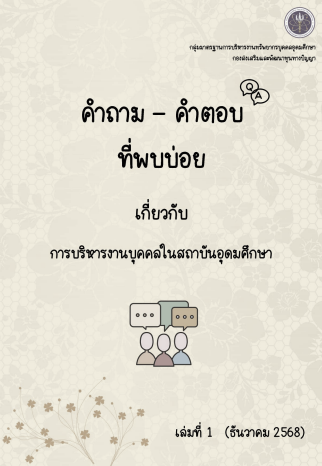
คู่มือแนวปฏิบัติและตอบข้อสงสัยด้านการบริหารทรัพยากรบุคคลสำหรับข้าราชการพลเรือนในสถาบันอุดมศึกษา
จัดทำโดย "กลุ่มมาตรฐานการบริหารงานทรัพยากรบุคคลอุดมศึกษา กองส่งเสริมและพัฒนาทุนทางปัญญา" โดยมีวัตถุประสงค์เพื่อให้ผู้บริหาร, ผู้ปฏิบัติงาน และบุคลากรในมหาวิทยาลัยสามารถนำไปใช้อ้างอิงและปฏิบัติงานได้อย่างถูกต้องและเป็นมาตรฐานเดียวกัน
เนื้อหาหลักในเอกสารครอบคลุม 6 หมวดหมู่สำคัญ ได้แก่
1.การกำหนดตำแหน่งและการแต่งตั้ง: อธิบายหลักเกณฑ์เกี่ยวกับการกำหนดตำแหน่งใหม่, การแต่งตั้งผู้บริหาร, การเลื่อนตำแหน่งให้สูงขึ้น, และการตัดโอนตำแหน่ง
2.การบรรจุกลับและการโอน: ให้แนวทางปฏิบัติกรณีการบรรจุบุคคลกลับเข้ารับราชการ (เช่น หลังลาออกไปสมัคร ส.ส.) และการรับโอนข้าราชการจากหน่วยงานอื่น
3.การประเมินผลการปฏิบัติงานและการเลื่อนเงินเดือน: ชี้แจงหลักเกณฑ์และวิธีการประเมินผลงานประจำปี รวมถึงกระบวนการและเงื่อนไขในการพิจารณาเลื่อนเงินเดือน
4.การได้รับเงินเดือนและเงินพิเศษต่างๆ: อธิบายเงื่อนไขการได้รับเงินเดือน, เงินประจำตำแหน่ง, และเงินเพิ่มพิเศษสำหรับตำแหน่งที่มีเหตุพิเศษ (พ.ต.ก., พ.ต.ส.)
5.การต่อเวลาราชการ: ระบุคุณสมบัติและขั้นตอนสำหรับข้าราชการ (โดยเฉพาะสายวิชาการ) ที่จะขอต่อเวลาราชการหลังเกษียณอายุ
6.เรื่องอื่นๆ: รวบรวมประเด็นปลีกย่อยที่สำคัญ เช่น การเปลี่ยนสถานภาพเป็นพนักงาน, การใช้คำนำหน้านามทางวิชาชีพ, และสถานะสมาชิก กบข.
-
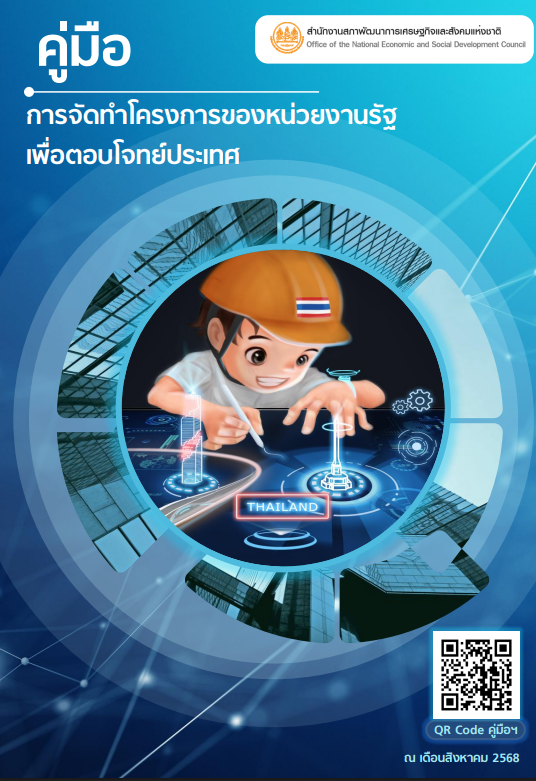
คู่มือการจัดทำโครงการของหน่วยงานรัฐเพื่อตอบโจทย์ประเทศ ของสำนักงานสภาพัฒนาการเศรษฐกิจและสังคมแห่งชาติ (สศช.) เพื่อให้หน่วยงานภาครัฐสามารถสร้างแผนงานที่สอดคล้องกับ ยุทธศาสตร์ชาติและแผนแม่บท ได้อย่างมีประสิทธิภาพ เนื้อหาครอบคลุมกระบวนการตั้งแต่ การวิเคราะห์ห่วงโซ่คุณค่าประเทศไทย (FVCT) การกำหนดชื่อโครงการ และการตั้งวัตถุประสงค์ตามหลัก SMART ที่ชัดเจน นอกจากนี้ยังให้ความสำคัญกับการใช้ ระบบฐานข้อมูล Big Data และ AI เช่น ระบบ TPMAP มาเป็นเครื่องมือหลักในการแก้ไขปัญหาความยากจนและการพัฒนาคน คู่มือยังแนะนำเทคนิคการบริหารงานแบบ PDCA พร้อมเครื่องมือจัดลำดับความสำคัญอย่าง Eisenhower Matrix เพื่อให้การใช้งบประมาณเกิดประโยชน์สูงสุด สุดท้ายยังมี Worksheet สำหรับฝึกปฏิบัติจริงเพื่อให้ผู้ใช้งานสามารถออกแบบโครงการที่มีความเชื่อมโยงกันตั้งแต่ระดับกิจกรรมไปจนถึงผลลัพธ์ในระยะยาว
-
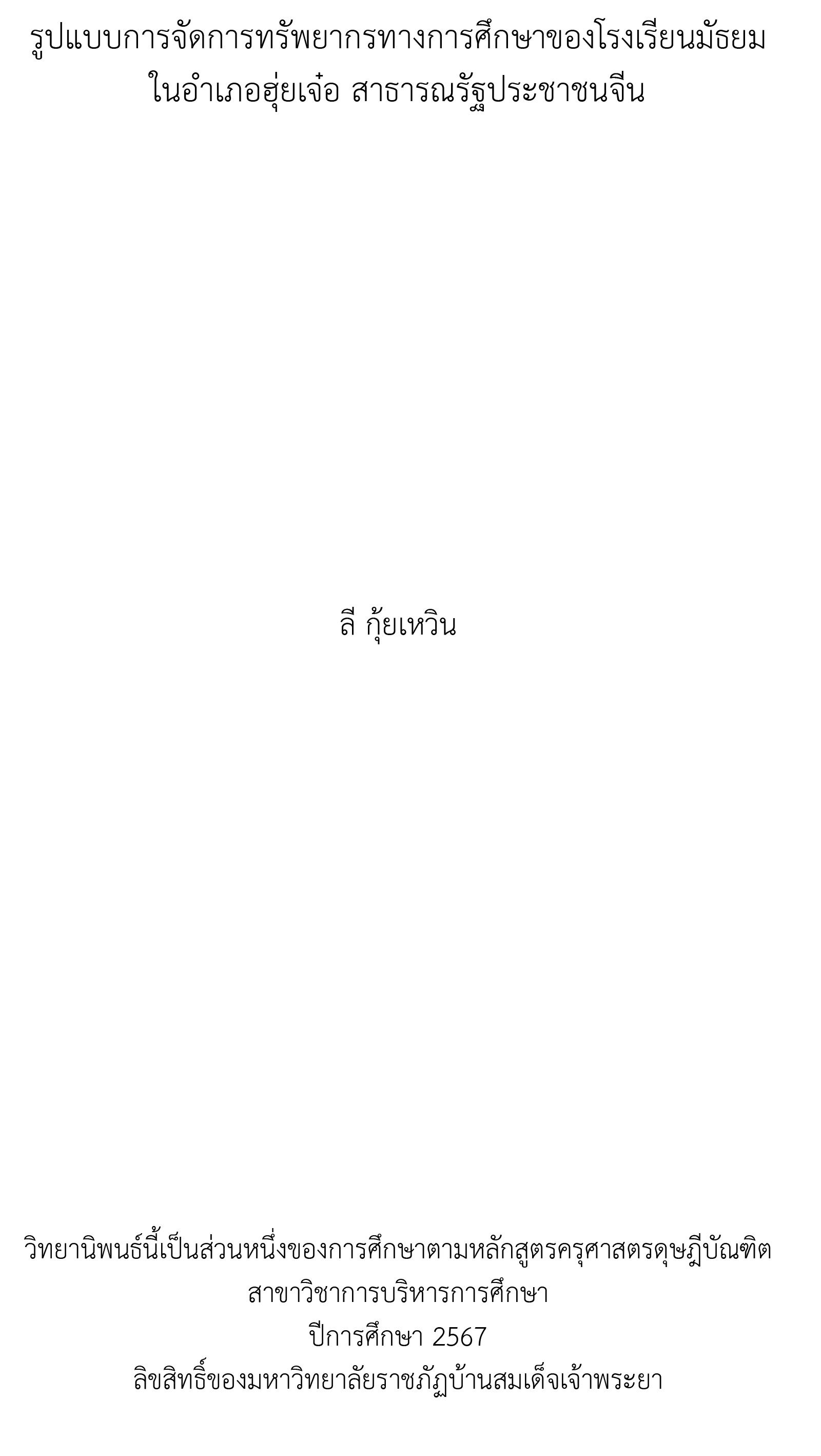
การวิจัยครั้งนี้มีวัตถุประสงค์เพื่อศึกษาการจัดการทรัพยากรทางการศึกษาของโรงเรียนมัธยมในอำเภอฮุ่ยเจ๋อ สาธารณรัฐประชาชนจีน และเพื่อศึกษารูปแบบการจัดการทรัพยากรทางการศึกษาของ
โรงเรียนมัธยมในอำเภอฮุ่ยเจ๋อ สาธารณรัฐประชาชนจีน และเพื่อประเมินรูปแบบการจัดการทรัพยากรทางการศึกษาของโรงเรียนมัธยมในอำเภอฮุ่ยเจ๋อ สาธารณรัฐประชาชนจีนใน 6 ด้าน ประกอบด้วย 1) ทรัพยากรด้านบุคคล 2) ทรัพยากรด้านการเงิน 3) ทรัพยากรด้านวัสดุ อุปกรณ์ และอาคารสถานที่ 4)ทรัพยากรด้านบริหารจัดการ 5) ทรัพยากรดเานเวลา 6) ทรัพยากรด้านเทคโนโลยีสารสนเทศ ประชากรที่ใช้ในการวิจัยครั้งนี้ ได้แก่ โรงเรียนมัธยมในอำเภอฮุ่ยเจ๋อจำนวน 7 โรงเรียน จำนวน 1,638 คน ประเทศสาธารณรัฐประชาชนจีน กลุ่มตัวอย่างที่ใช้ในการศึกษาครั้งนี้ได้แก่ ผู้บริหาร คณะครูและบุคลากรทางการศึกษา โรงเรียนมัธยมในอำเภอฮุ่ยเจ๋อ โดยการสุ่มแบบเจาะจงจากโรงเรียนมัธยมในอำเภอฮุ่ยเจ๋อ 7 แห่ง รวมทั้งสิ้น 310 คน กลุุ่มผู้ให้ข้อมูลประเมินรอบที่ 1 ได้แก่ ผู้บริหาร คณะครูและบุคลากรทางการศึกษาโรงเรียนมัธยมในอำเภอฮุ่ยเจ๋อ รวมทั้งสิ้น 10 คน กลุ่มผู้ให้ข้อมูลการสัมภาษณ์ ประกอบด้วย
ผู้ทรงคุณวุฒิ ผู้บริหาร คณะครูและบุคลากรทางการศึกษา และผู้ที่มีบทบาทหลักของการจัดการทรัพยากรทางการศึกษาจำนวน 20 คน เครื่องมือที่ใช้ในการวิจัยเป็นแบบสอบถามมาตรประมาณค่า 5 ระดับ สถิติที่ใช้ในการวิเคราะห์ข้อมูล ได้แก่ ค่าร้อยละ ค่าเฉลี่ย และส่วนเบี่ยงเบนมาตรฐาน
ผลการวิจัยพบว่า รูปแบบการจัดการทรัพยากรทางการศึกษาของโรงเรียนมัธยมในอำเภอ ฮุ่ยเจ๋อ สาธารณรัฐประชาชนจีน โดยภาพรวมอยู่ในระดับมาก เมื่อพิจารณาเป็นรายด้าน พบว่า ทรัพยากรด้านเวลา มีค่าเฉลี่ยสูงสุด รองลงมาคือ ทรัพยากรด้านบริหารจัดการ ส่วนทรัพยากรด้านวัสดุอุปกรณ์ และอาคารสถานที่ มีค่าเฉลี่ยต่ำสุด โดยผู้บริหารโรงเรียนมัธยมในอำเภอฮุ่ยเจ๋อ สนับสนุนงบประมาณในการพัฒนาระบบสารสนเทศขององค์กร มีวิสัยทัศน์ที่กว้างไกลในการกำหนดเป็าหมายของสถานศึกษา สนับสนุนให้มีการจัดสภาพแวดล้อม ให้มีวัสดุอุปกรณ์เสริมสร้าง และส่งเสริมการเรียนรู้ที่หลากหลาย การพัฒนารูปแบบการจัดการทรัพยากรทางการศึกษา พบว่า 1) ทรัพยากรด้านบุคคล ได้รูปแบบดังนี้ มีทัศนคติที่ดีในการทำงาน มีความกระตือรือร้นใส่ใจในการทำงาน มีการวางแผนการดำเนินงาน มีการฝึกฝนพัฒนาตนเองอย่างต่อเนื่อง มีความสามัคคีต่อกัน 2) ทรัพยากรด้านการเงิน ได้รูปแบบดังนี้ การจัดการพฤติกรรมด้านการเงินที่เหมาะสม ให้คำแนะนำด้านการบริหารเงิน กำหนดเป้าหมายทางการเงินที่ชัดเจน การวางแผนด้านการเงินที่ดี มีการวิเคราะห์และควบคุมค่าใช้จ่าย 3) ทรัพยากรด้านวัสดุ อุปกรณ์ และอาคารสถานที่ ได้รูปแบบดังนี้ การวางแผนเพื่อการจัดการด้านวัสดุอุปกรณ์ และอาคารสถานที่ จัดสภาพแวดล้อมให้ช่วยลดมลภาวะในสถานศึกษา มีแผนงานรองรับในการปรับปรุง ซ่อมแชม อาคารสถานที่ มีเป้าหมายสอดคล้องกับบริบทของสถานศึกษา จัดสภาพแวดล้อมที่เอื้อต่อการเรียนรู้ และการปฏิบัติงาน 4) ทรัพยากรด้านบริหารจัดการ ได้รูปแบบดังนี้ มีการวางแผนการดำเนินงานอย่างเป็นระบบ มอบหมายงานตามความสามารถของแต่ละบุคคล พร้อมรับฟังความคิดเห็นที่หลากหลาย ใช้ทรัพยากรที่มีอยู่อย่างจำกัดได้อย่างมีประสิทธิภาพ จัดสภาพแวดล้อมที่ส่งเสริมต่อการปฏิบัติงาน 5) ทรัพยากรด้านเวลา ได้รูปแบบดังนี้ มีวิสัยทัศน์ที่กว้างไกล ให้ความสำคัญกับการควบคุมการใช้เวลาในการทำงานเสมอจัดทำกิจกรรมปฏิทินปฏิบัติงาน สนับสนุนการดำเนินงานที่สร้างสรรค์ วางแผนจัดการแบ่งเวลาในการใช้ชีวิตได้อย่างมีประสิทธิภาพ 6)ทรัพยากรด้านเทคโนโลยีสารสนเทศ ได้ รูปแบบดังนี้ การพัฒนาระบบสารสนเทศขององค์กรให้มีประสิทธิภาพ มีทัศนคติที่ที่ที่ต่อการใช้ระบบ สารสนเทศใช้ระบบสารสนเทศในการปฏิบัติงาน พร้อมจะเรียนรู้เมื่อมีระบบสารสนเทศใหม่ ๆ
คำสำคัญ : ทรัพยากรทางการศึกษา โรงเรียนมัธยมในอำเภอฮุ่ยเจ๋อ
-
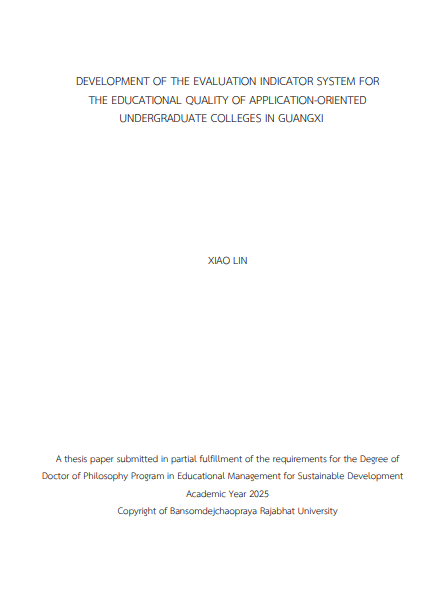
This study aimed to 1) examine the current status of educational quality evaluation in application-oriented undergraduate colleges in Guangxi, 2) develop an evaluation indicator system for the educational quality of application-oriented undergraduate colleges in Guangxi, and 3) examine the system’s feasibility and adaptability. A mixed-methods approach was employed, combining quantitative methods (questionnaires) with qualitative techniques (document analysis, in-depth interviews, focus group discussions, and the Delphi method). Data were collected from 661 stakeholders, including teachers, administrators, and teaching supervisors.
The findings revealed that: 1) The overall educational quality in Guangxi’s application-oriented undergraduate colleges was moderate. Among the four dimensions (context, input, process, and output), the input dimension performed best, particularly in infrastructure and faculty development. In contrast, the output dimension was weakest, especially in graduate readiness and alignment with labour market needs, highlighting the necessity for a more outcome-oriented evaluation framework. 2) The evaluation system was developed through expert consultation and refined via the Delphi method. The final model comprised six first-level, 17 second-level, and 50 third-level indicators, encompassing the educational environment, development level, investment level, teacher level, school quality, and student quality. The system emphasises student-centredness, contextual relevance, and practical applicability. 3) Expert evaluations confirmed its high feasibility and adaptability, with mean scores of 4.33 and 4.15, respectively, indicating strong consensus. These findings affirm the system’s scientific rigour and practical utility as a tool for institutional assessment, policy development, and continuous quality improvement in application-oriented higher education in Guangxi.
Keywords: Evaluation Indicator System, Educational Quality, ApplicationOriented Undergraduate Colleges, Feasibility and Adaptability
-
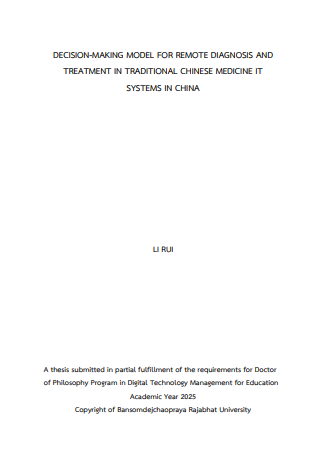
The rapid evolution of information technology (IT) has transformed global healthcare systems, introducing innovative solutions for remote medical services. In the context of Traditional Chinese Medicine (TCM), a discipline deeply rooted in holistic and individualized treatment approaches, the integration of IT presents both opportunities and challenges. This dissertation proposes a comprehensive Decision Making Model for Remote Diagnosis and Treatment Courses in Traditional Chinese Medicine IT in China, aimed at enhancing clinical decision-making, improving treatment efficiency, and ensuring the sustainability of TCM in the digital era.
The proposed model is developed through a multi-disciplinary, expert-driven methodology, involving three distinct groups of professionals: 10 information technology experts, 10 TCM practitioners, and 10 experts specializing in remote diagnosis and treatment. The model was evaluated through a structured Delphi study and iterative expert consultations, ensuring that it not only reflects the latest advancements in IT infrastructure but also respects the philosophical and clinical principles inherent in TCM practice. The combined expertise of these 30 specialists resulted in a unanimous consensus affirming the scientific validity, practical feasibility, and clinical relevance of the decision-making framework.
Following this foundational validation, the model was subjected to a second round of critical assessment by a higher-level expert panel consisting of 9 senior authorities, each with extensive experience and recognized leadership in their respective domains. Their unanimous approval further confirms the model’s strategic importance and readiness for practical implementation in the national TCM telemedicine system.
The model features a layered structure that incorporates patient data acquisition, pattern recognition based on traditional diagnostics (such as pulse, tongue, and symptom differentiation), algorithmic decision-making supported by AI and cloud computing, and adaptive feedback mechanisms to continuously improve diagnostic accuracy and treatment outcomes. The model is particularly designed to support practitioners in rural and underserved areas, where access to high-level TCM expertise may be limited.
The significance of this study lies in its ability to bridge ancient medical wisdom with contemporary digital tools, creating a hybrid framework that supports personalized care, standardized procedures, and scalable implementation. This research also addresses key challenges in remote TCM practice, such as data tandardization, practitioner training, patient engagement, and legal-ethical considerations in cross-regional telemedicine delivery.
This dissertation contributes not only to academic knowledge but also offers a practical roadmap for policymakers, healthcare administrators, and medical IT developers aiming to build a more integrated and resilient healthcare system in China. Future research may expand this model to include cross-border applications, integration with Western medicine systems, and the use of big data analytics for national healthcare strategy development.
Keywords: Curriculum Development; Remote Diagnosis; Treatment Courses; Traditional Chinese Medicine; Information Technology
-
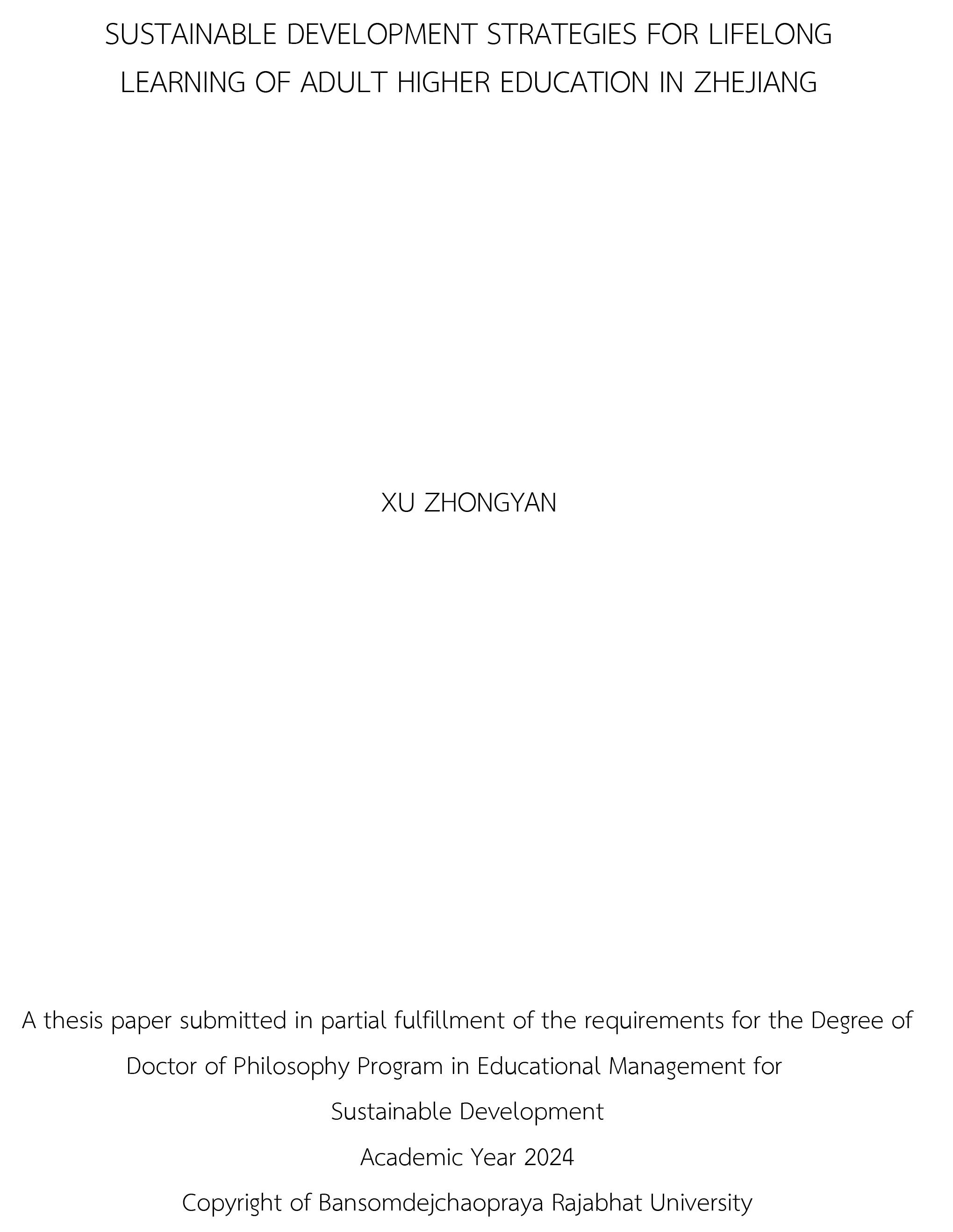
The objectives of this research were 1) to investigate the current situation and expected trend of sustainable development of lifelong learning in adult higher education in Zhejiang Province; 2) to develop strategies for the sustainable development of lifelong learning of adult higher education in Zhejiang Province; 3) to evaluate the adaptability and feasibility of the strategies sustainable development for lifelong learning of adult higher education in Zhejiang Province. The sample group of
this study 384 students and 10 interview experts, 10 focus group discussion experts and 5 strategy assessment experts. The research tools included 1) questionnaires; 2) interviews; 3) strategies; and 4) assessment forms. Statistical methods used to analyze the data included percentage, mean, standard deviation, modified Priority Needs Index (PNImodified) and content analysis. The research instruments included 1) questionnaires, 2) interview and 3) strategies, and 4) evaluation form. The statistic to analyze the data were percentages, mean, stand deviations, Modified Priority Needs
Index; (PNImodified) and content analysis.
The results of the study found
1) The current status of sustainable development of lifelong learning in adult education in Zhejiang Province is generally moderate. Considering the overall ideal situation, it is at a good level.
2) Formulate strategies for promoting lifelong learning in adult education in Zhejiang Province, including 26 strategies in 4 aspects, build institutional measures, including 6 strategies, improve the management system, including 8 strategies, enhance learning motivation, including 7 strategies, and evaluate education quality, including 5 strategies.
3) The feasibility and adaptability evaluation of strategies for promoting lifelong learning in adult education in Zhejiang Province, the overall evaluation result is the highest level.
Keywords: Strategies Developing; Lifelong Learning; Sustainable Development; Adult Higher Education
-
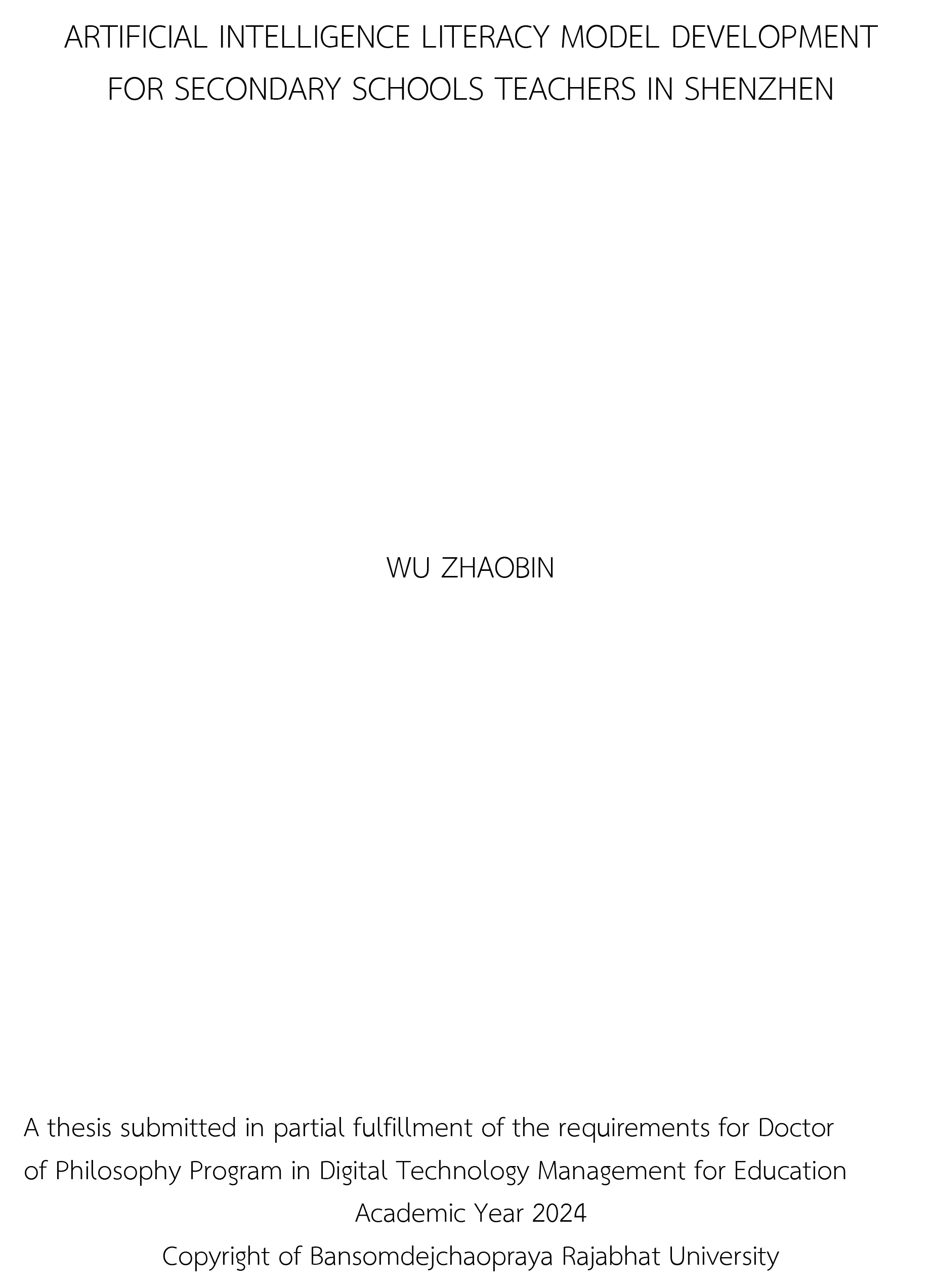
The purposes of this research were: 1) To study the current level of knowledge of secondary school teachers' artificial intelligence literacy. 2) To develop a teachers' artificial intelligence literacy improvement model for secondary schools. 3) To evaluate the teachers' artificial intelligence literacy improvement model.
The study invited 21 experts to conduct three rounds of consulting using the Delphi method to identify core competencies and refine the model components. This was done to determine the variable issues of effective teachers’ artificial intelligence literacy, resulting in the developing of a model for improving secondary school teachers' primary index factors includes: Cognition, Ethics, Artificial Intelligence Applications, Artificial Intelligence Pedagogy, Development, and Evaluation. artificial intelligence literacy. For the accuracy of the data, the interviewees were experts with professorial titles from artificial intelligence professionals, the online education field, and normal universities. The expert qualifies to have the rank of professor or above and has at least 20 years of experience working in a related field.
The results of the study found that 30 secondary school teachers in Shenzhen had significantly higher post-test scores than pre-test scores at a significance level of 0.05.
Keywords: Artificial Intelligence Literacy, TAILM Model, Teacher Professional Development, Delphi Method, Educational Technology, AI Ethics
-

สํานักวิทยบริการและเทคโนโลยีสารสนเทศ ภายใต้ชื่อรายการ มือไม่โปรก็โชว์ได้ ( EP.4 ) Build your own book สมุดทำมือ
ได้แนะนำวิธีการทำสมุดทำมือ ที่ไม่เพียงแต่เป็นการสร้างสรรค์ผลงานที่มีเอกลักษณ์ แต่ยังเป็นกิจกรรมที่ทำให้ผู้ชมสามารถใช้เวลาว่างให้เกิดประโยชน์ โดยการทำสมุดจดเลคเชอร์ที่สามารถปรับแต่งได้ตามสไตล์ของตัวเอง
ขั้นตอนการทำ
1. วัสดุอุปกรณ์: กระดาษ, กรรไกร, กระดูกงู (สันห่วงพลาสติก), สติกเกอร์
2. การประกอบ: เริ่มต้นจากการเลือกกระดาษที่ต้องการใช้ ทำการตัดและจัดเรียงให้เป็นรูปเล่ม
3. การติดสันห่วง: ใช้กระดูกงู (สันห่วงพลาสติก) เพื่อให้สมุดเป็นรูปเล่ม
4. การตกแต่งปก: วาดหรือใช้สติกเกอร์ตกแต่งหน้าปกให้มีเอกลักษณ์ตามสไตล์ของตนเอง
การทำสมุดทำมือในรายการนี้ช่วยให้ผู้ชมสามารถสร้างสรรค์ผลงานที่ไม่ซ้ำใคร โดยใช้วัสดุที่หาซื้อได้ง่ายๆ และยังช่วยให้ผู้ชมใช้เวลาว่างให้เกิดประโยชน์ พร้อมทั้งได้เรียนรู้กิจกรรมสร้างสรรค์ที่สนุกสนานจากห้องสมุด.












